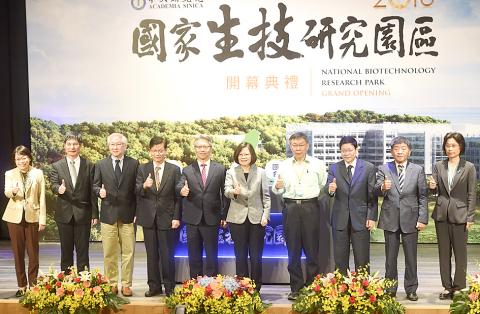President Tsai Ing-wen (蔡英文) yesterday inaugurated the National Biotechnology Research Park in Taipei’s Nangang District (南港), saying its opening marks a giant step in the development of the nation’s biotech industry.
The park houses the Ministry of Health and Welfare’s Food and Drug Administration, the Ministry of Science and Technology’s National Laboratory Animal Center, the Ministry of Economic Affairs’ Development Center for Biotechnology, an incubation center, two Academia Sinica research centers and a bioinformatics center.
While some of the agencies moved in last year, the park’s inauguration had been put off several times.

Photo: Chien Jung-fong, Taipei Times
With Academia Sinica leading the project and a budget of more than NT$20 billion (US$646.4 million), the park was set up on a site that used to house the Ministry of National Defense’s 202nd Arsenal.
“Taiwan’s essential competitiveness in the next generation will stem from the biotech and biomedical industries,” Tsai said in her speech at the opening, expressing her hope that the park would be connected with the Hsinchu Biomedical Science Park to form an industrial corridor.
Aided by the passage of amendments to the Fundamental Science and Technology Act (科學技術基本法) and the Act for the Development of Biotech and New Pharmaceuticals Industry (生技新藥產業發展條例) last year, the nation’s biotech industry should be able to attract more talented people, she said.
The project had been overseen by three former presidents — Lee Teng-hui (李登輝), Chen Shui-bian (陳水扁) and Ma Ying-jeou (馬英九) — as well as Tsai and Vice President Chen Chien-jen (陳建仁), Academia Sinica President James Liao (廖俊智) said, adding that two of the institute’s former presidents, Lee Yuan-tseh (李遠哲) and Wong Chi-huey (翁啟惠), also provided vital contributions.
Given environmental groups’ concern over the project’s potential impact on local species, the institution has restricted buildings to 3 hectares, while maintaining a 4-hectare ecological pool and reserving the rest for ecological restoration, Liao said.
The park is to be managed by a cross-agency committee, with Academia Sinica academician Andrew Wang (王惠鈞) serving as acting chief executive and National Taiwan University animal science professor Ding Shih-torng (丁詩同), who is also the director of the park’s incubation center, as its acting deputy executive.

CALL FOR SUPPORT: President William Lai called on lawmakers across party lines to ensure the livelihood of Taiwanese and that national security is protected President William Lai (賴清德) yesterday called for bipartisan support for Taiwan’s investment in self-defense capabilities at the christening and launch of two coast guard vessels at CSBC Corp, Taiwan’s (台灣國際造船) shipyard in Kaohsiung. The Taipei (台北) is the fourth and final ship of the Chiayi-class offshore patrol vessels, and the Siraya (西拉雅) is the Coast Guard Administration’s (CGA) first-ever ocean patrol vessel, the government said. The Taipei is the fourth and final ship of the Chiayi-class offshore patrol vessels with a displacement of about 4,000 tonnes, Lai said. This ship class was ordered as a result of former president Tsai Ing-wen’s (蔡英文) 2018

‘SECRETS’: While saying China would not attack during his presidency, Donald Trump declined to say how Washington would respond if Beijing were to take military action US President Donald Trump said that China would not take military action against Taiwan while he is president, as the Chinese leaders “know the consequences.” Trump made the statement during an interview on CBS’ 60 Minutes program that aired on Sunday, a few days after his meeting with Chinese President Xi Jinping (習近平) in South Korea. “He [Xi] has openly said, and his people have openly said at meetings, ‘we would never do anything while President Trump is president,’ because they know the consequences,” Trump said in the interview. However, he repeatedly declined to say exactly how Washington would respond in

WARFARE: All sectors of society should recognize, unite, and collectively resist and condemn Beijing’s cross-border suppression, MAC Minister Chiu Chui-cheng said The number of Taiwanese detained because of legal affairs by Chinese authorities has tripled this year, as Beijing intensified its intimidation and division of Taiwanese by combining lawfare and cognitive warfare, the Mainland Affairs Council (MAC) said yesterday. MAC Minister Chiu Chui-cheng (邱垂正) made the statement in response to questions by Democratic Progressive Party (DPP) Legislator Puma Shen (沈柏洋) about the government’s response to counter Chinese public opinion warfare, lawfare and psychological warfare. Shen said he is also being investigated by China for promoting “Taiwanese independence.” He was referring to a report published on Tuesday last week by China’s state-run Xinhua news agency,

‘ADDITIONAL CONDITION’: Taiwan will work with like-minded countries to protect its right to participate in next year’s meeting, the foreign ministry said The US will “continue to press China for security arrangements and protocols that safeguard all participants when attending APEC meetings in China,” a US Department of State spokesperson said yesterday, after Beijing suggested that members must adhere to its “one China principle” to participate. “The United States insists on the full and equal participation of all APEC member economies — including Taiwan — consistent with APEC’s guidelines, rules and established practice, as affirmed by China in its offer to host in 2026,” the unnamed spokesperson said in response to media queries about China putting a “one China” principle condition on Taiwan’s